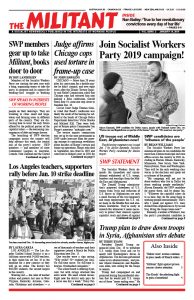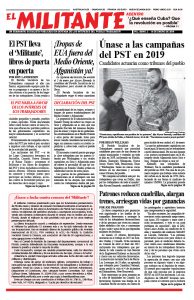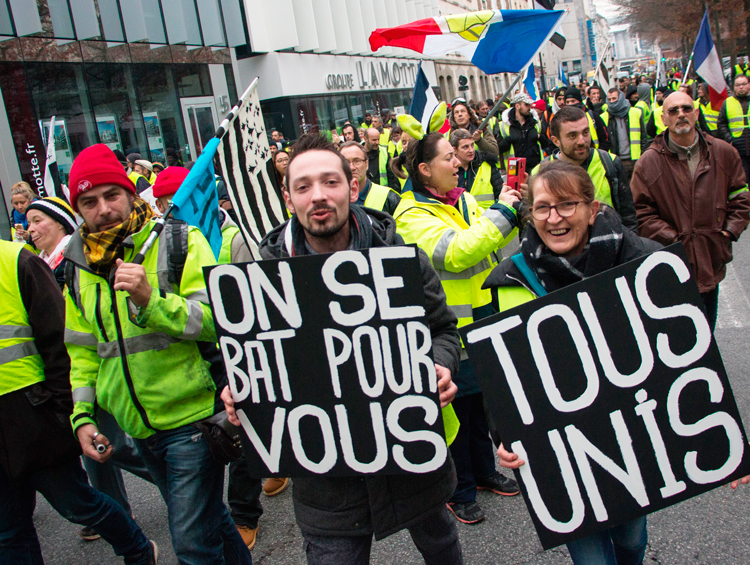LONDON — Thousands of “gilets jaunes” — yellow vests — continue to protest in France, especially in cities and rural areas outside Paris and other large cities, despite government concessions and a police crackdown on roadblocks and roadside encampments in some areas.
“Police shut down the roundabout protests in Dieppe and Forges-Les-Eaux Dec. 16,” Arnold, who had helped Militant reporters from the U.K. visit roadblock protests there in mid-December, said in a telephone interview.
In the south of France, Militant correspondent Jacques Salfati visited coastal Hyeres, where he reports the protests, though smaller, are still well attended.
“I’m in the countryside near Ales, an industrial town of 40,000 inhabitants inland,” Nat London reported. “I counted about 35 at the Route de Bagnol traffic circle protest. The other four I visited were slightly smaller.”
The French big business media focus on declining participation in the Saturday actions in Paris and some other larger cities — many marked by cop tear gas and violence, and provocations by antifa types. But the bulk of the protests remain in places like Ales, where yellow vests opted to stay put on Saturday rather than join other actions.
“They take us for savages,” one of the demonstrators at a protest camp in Frejus, complained to the south French paper Var-Matin. “They’re mistaken.” Many at the protest camp there had written “We aren’t vandals” on the back of their yellow vests.
Gov’t forced to make concessions
The catalyst for the yellow vest revolt was a hike in vehicle fuel taxes aimed at forcing workers to drive less in the name of “climate change.” The protests forced the government of President Emmanuel Macron to abandon these taxes and other measures he planned to impose. The taxes were, as many workers said, the straw that broke the camel’s back after decades of declining living standards for workers, family farmers and other small proprietors in France. Workers and tradesmen outside of Paris depend on their cars to get to work, to the store, to live.
Macron, a former investment banker, has been a central target of the yellow vests. His disdain for working people is legion, echoing Hillary Clinton calling workers who didn’t vote for her “deplorables.” Macron says their French fellow workers are infected with populist “leprosy.” Workers call him the “president of the rich.” Normally hugging the limelight, Macron has conspicuously pulled back over the last couple of weeks.
Dominique, a retired ironworker and one of the protesters in Ales, railed against “politicians and bankers” like Macron. “The people should have the power to decide for themselves,” he said. Wine merchant Francis called for the nationalization of the telecommunications system, the highways and the largest banks; for raising the minimum wage; and cutting taxes on small businesses.
“The most important thing is living standards, wages and retirement benefits,” 64-year-old Marie-Andree told Nat London. “Everyone should have a livable income when we retire.”
“The anger has not gone away,” Arnold told me on the phone. “While the roadblocks have been cleared in Dieppe and Forges, a farmer sympathetic to the yellow vests provided roadside land for an ongoing visible protest. In nearby Rouen, the region’s capital city, yellow vests have returned over and over after being regularly expelled by the cops. Many have said that they’ll be back in the New Year. So we’ll see.”
Regular acts of solidarity with the yellow vests continue. “On Tuesday an Algerian couple brought us three enormous plates of couscous,” Noel enthusiastically told Var-Matin at the camp in Frejus. A couple from Paris, Pierre and Sophie, brought fruit to protesters at the camp.
Protests deepen crisis of EU
The continuing force of the yellow vests revolt has put fear into the souls of capitalist politicians and bourgeois commentators as to the future of the Macron government and to prospects of holding together the European Union, already ripping at its seams.
In a Dec. 30 article in the Financial Times, Wolfgang Munchau lamented Macron’s decline. He called the French president crucial for his “vision for the future of the EU and the eurozone.” But he’s been damaged by having to make concessions to the protesters. “It is not hard to see why he had to do this,” Munchau wrote. But a failure to regain his stature “would probably end any hopes of further European integration for a long time.”
Workers in Bury St Edmunds, a town of 40,000 in East Anglia, 85 miles northeast of London, had quite a different reaction to the gains won by the yellow vests. “We need to be doing something like that here,” retired construction worker Ronald Hubbard told Communist League members who knocked on his door Dec. 29 to introduce the party.


